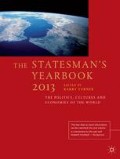Abstract
The Bulgarians take their name from an invading Asiatic horde (Bulgars) and their language from the Slav population, with whom they merged after 680. The Bulgarians carved out empires against a background of conflict with Byzantium and Serbia but, after the Serb-Bulgarian defeat at Kosovo in 1389, Bulgaria finally succumbed to Ottoman encroachment. The Ottoman empire’s decline, however, brought rebellion and brutal repression, provoking great power intervention. By the Treaty of Berlin (1878), Macedonia and Thrace reverted to Turkey, Eastern Rumelia became semi-autonomous and Bulgaria proper became a principality under Turkish suzerainty.
Preview
Unable to display preview. Download preview PDF.
Further Reading
Central Statistical Office. Statisticheski Godishnik.—Statisticheski Spravochnik (annual).—Statistical Reference Book of Republic of Bulgaria (annual).
Crampton, Richard J., A Concise History of Bulgaria. 2nd ed. 2005
Melone, A., Creating Parliamentary Government: The Transition to Democracy in Bulgaria. 1998
National Statistical Office: Natsionalen Statisticheski Institut, 2 P. Volov St., 1038 Sofia. President: Mariana Kotzeva.
Website: http://www.nsi.bg
Editor information
Copyright information
© 2012 Palgrave Macmillan, a division of Macmillan Publishers Limited
About this chapter
Cite this chapter
Turner, B. (2012). Bulgaria. In: Turner, B. (eds) The Statesman’s Yearbook. The Statesman’s Yearbook. Palgrave Macmillan, London. https://doi.org/10.1007/978-1-349-59541-9_185
Download citation
DOI: https://doi.org/10.1007/978-1-349-59541-9_185
Publisher Name: Palgrave Macmillan, London
Print ISBN: 978-0-230-36009-9
Online ISBN: 978-1-349-59541-9
eBook Packages: Palgrave Political & Intern. Studies CollectionPolitical Science and International Studies (R0)

